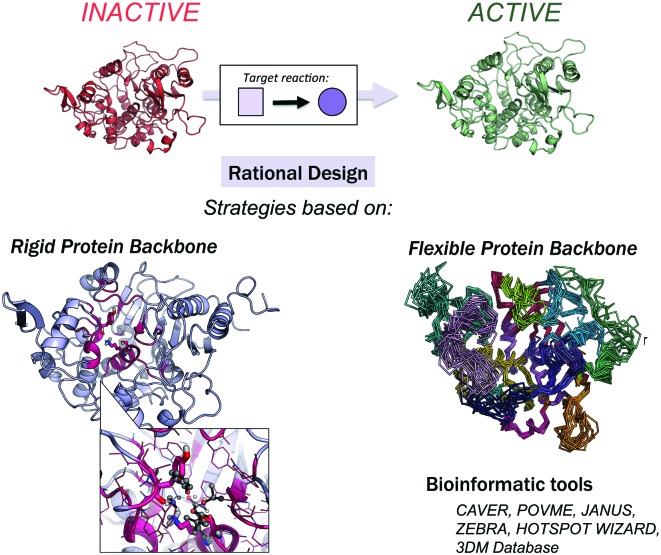Rational Enzyme Design Services
Our company is a leading company specializing in the design and optimization of enzymes for a wide range of applications. Our comprehensive services encompass various aspects of enzyme engineering, allowing us to tailor enzymes to meet specific needs and unlock their full potential.
Overview of Rational Enzyme Design:
Rational Enzyme Design is a branch of enzyme engineering that involves the deliberate modification and optimization of enzymes using rational and computational approaches. It aims to enhance the catalytic efficiency, substrate specificity, stability, and other properties of enzymes for various applications. By understanding the relationship between enzyme structure and function, we can make informed modifications to enhance enzyme performance.
Our Services:
• Active Site Engineering:
Our team of experienced scientists excels in modifying the active site of enzymes. By precisely engineering the active site residues, we can enhance enzyme catalytic efficiency, substrate specificity, and reaction kinetics, enabling enzymes to perform with exceptional precision and effectiveness.
• Allosteric Regulation Design:
We have expertise in designing enzymes that respond to allosteric regulation. Through careful modifications, we can introduce or alter allosteric sites, allowing for precise control over enzyme activity, stability, and substrate binding properties. This enables fine-tuning of enzyme behavior for optimal performance.
• Cofactor Integration:
Our services include the integration of cofactors into enzymes, expanding their catalytic capabilities. By introducing or modifying cofactor binding sites, we enhance enzyme activity, enable new reaction pathways, and improve cofactor utilization efficiency. This empowers enzymes to catalyze a broader range of reactions with enhanced efficiency.
• Enzyme Immobilization Design:
We specialize in designing enzyme immobilization strategies that enhance enzyme stability, reusability, and ease of separation. Through the attachment or encapsulation of enzymes onto solid supports or matrices, we enable the development of robust biocatalysts suitable for various applications, including biocatalysis, biosensing, and bioremediation.
• Evolutionary Trace Analysis:
Our team utilizes evolutionary trace analysis to extract crucial information from enzyme sequences. By analyzing evolutionary conservation patterns, we identify important residues and functional regions, providing valuable insights for the rational design of enzymes with improved properties or novel functionalities.
• Covalent Catalysis Enhancement:
We excel in enhancing covalent catalytic reactions by modifying enzyme active sites. Through tailored modifications, we facilitate covalent bond formation or stabilization, resulting in enzymes with enhanced catalytic efficiency, reaction selectivity, and substrate scope. This opens up new opportunities in various industries, including pharmaceuticals and fine chemicals.
• Enzyme Fusion Design:
We offer enzyme fusion design services that combine the catalytic domains of different enzymes. By fusing enzymes, we create multifunctional biocatalysts with synergistic effects, expanded substrate specificity, and improved reaction efficiency. Enzyme fusion opens up new possibilities for enzymatic transformations and synthetic routes.
• Enzyme Cascade Design:
Our expertise lies in designing enzyme cascades, where multiple enzymes work together in a coordinated manner to perform complex reactions or sequential transformations. By optimizing the enzyme cascade design, we achieve efficient conversion of substrates into desired products, mimicking natural metabolic pathways or enabling novel synthetic routes.
• Enzyme Oligomerization Design:
We specialize in designing enzymes with specific oligomeric states, such as dimers, trimers, or higher-order complexes. By controlling enzyme oligomerization, we influence enzyme stability, activity, substrate binding, or allosteric regulation, offering opportunities for fine-tuning enzyme properties and expanding their functionalities.
• Substrate Specificity Modification:
Our services focus on modifying enzyme substrate specificity to broaden or alter the range of substrates an enzyme can accept. Through rational design or directed evolution approaches, we modify enzyme active sites or binding pockets to accommodate structurally diverse substrates. This enables the development of versatile biocatalysts for various applications.
Our company combine our expertise, advanced computational tools, and state-of-the-art techniques to deliver customized solutions that optimize enzyme properties, facilitate innovation, and drive progress in a wide range of industries. Contact us and unlock the full potential of enzymes for your specific needs.
Reference: Romero-Rivera, A.; et al. Computational tools for the evaluation of laboratory-engineered biocatalysts. Chemical communications (Cambridge, England). 2016. 53(2): p. 284-297.
Fig. 1. Available strategies for the rational design of enzymes. (Romero-Rivera, A.; et al. 2016)

